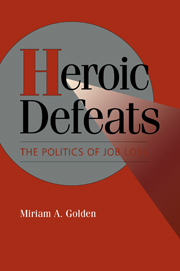Book contents
- Frontmatter
- Contents
- Preface
- List of Abbreviations
- Chapter 1 The Puzzle of Union Responses to Workforce Reductions
- Chapter 2 Games Analyzing Job Loss
- Chapter 3 Job Loss in the Italian and British Automobile Industries
- Chapter 4 Triggers of Industrial Action
- Chapter 5 Pit Closures in the Japanese and British Mining Industries
- Chapter 6 Seeking Allies: How Other Actors Affect Interactions over Job Loss
- Chapter 7 Conclusions
- Notes
- References
- Index
Chapter 7 - Conclusions
Published online by Cambridge University Press: 20 January 2010
- Frontmatter
- Contents
- Preface
- List of Abbreviations
- Chapter 1 The Puzzle of Union Responses to Workforce Reductions
- Chapter 2 Games Analyzing Job Loss
- Chapter 3 Job Loss in the Italian and British Automobile Industries
- Chapter 4 Triggers of Industrial Action
- Chapter 5 Pit Closures in the Japanese and British Mining Industries
- Chapter 6 Seeking Allies: How Other Actors Affect Interactions over Job Loss
- Chapter 7 Conclusions
- Notes
- References
- Index
Summary
In the preceding chapters, we have seen that disputes over large-scale personnel reductions are neither inevitable nor unpredictable. Rather, they occur under circumstances that can be specified theoretically. These circumstances are of two types. First, a firm may inadvertently target too many union activists during the course of downsizing for its trade union to tolerate. This was the case at the Fiat works in 1980, at British Leyland in 1956, and at the Miike mines in 1953. Second, industrial action may occur if offers from outside actors (such as a national business association or a national trade union) to subsidize the costs of conflict lower the costs so as to incite both sides to conflict; in this case, each side prefers conflict over nonengagement because conflict becomes relatively cheap. This was the case at Miike in 1959 and in the British mining industry in 1984.
In this chapter I consider three issues relevant to the main argument developed in this book. I first seek to resolve a puzzle presented in the opening pages of this study about why disputes over workforce reductions so often seem irrational. I then examine two extensions of the major argument presented in this book, extensions that, if shown to be true, would increase our confidence in the argument developed here. If my analysis is correct and Fiat's management did not intend to provoke industrial action, whereas Nikkeiren and the Thatcher government did, different consequences for the various industrial relations systems should obtain.
- Type
- Chapter
- Information
- Heroic DefeatsThe Politics of Job Loss, pp. 135 - 160Publisher: Cambridge University PressPrint publication year: 1996

